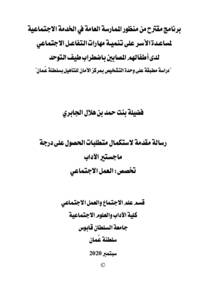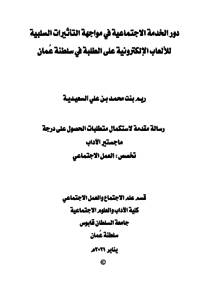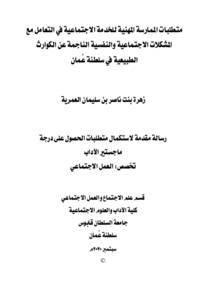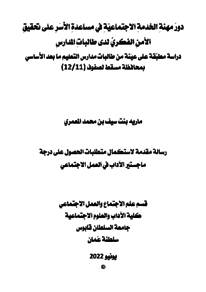Document
برنامج مقترح من منظور الممارسة العامة في الخدمة الاجتماعية لمساعدة الأسـر على تنميـة مهارات التفاعـل الاجتماعي لدى أطفالهم المصابين باضطراب طيف التوحد : "دراسة مطبقة على وحدة التشخيص بمركز الأمان للتأهيل بسلطنة عمان.
Publisher
جامعة السلطان قابوس.
Gregorian
2020
Language
Arabic
Subject
English abstract
A proposed Program from Social Work Generalist Practice Perspective
to Help Families Develop Social Interaction Skills in their Children
with Autism Spectrum Disorder (ASD)
A study Applied to the Diagnosis Unit of 'Al Aman' Rehabilitation
Centre In the Sultanate of Oman
Fadhila Hamed Hilal Al Jabri
Abstract in English
The current study aimed at propose A proposed Program from a Social Work Generalist
Practice Perspective to Help Families Develop Social Interaction Skills in their Children with
Autism Spectrum Disorder (ASD) by achieving four aims: Identifying the level of social interaction
skills of children with autism in the Diagnosis Unit, Identifying programs that could contribute to
the development of social interaction skills of children with autism, Identifying the difficulties in
the field of Autism Spectrum Disorder and suggestions or solutions to overcome those difficulties,
and Defining the potential role of the social worker in the field of Autism Spectrum Disorder from
the respondents perspective.
The research followed the descriptive analytical studies. It is based on the approach of the
social survey with its two types: (1) The comprehensive social survey targeting both children with
autism and the autism specialists and (2) A social sample survey targeting the social workers and
the management of the center. Three tools were used to collect data which were designed by the
researcher. These tools are; Social Interaction Skills Scale (SISS) of children with autism and
which was applied to 46 autistic children؛ semi- structure interviews that were directed to
specialists in the field؛ the focus groups؛ and semi- structured interviews conducted remotely
(electronically) targeting the families of these children.
study results reveals that the level of social interaction skills among children with Autism
Spectrum Disorder is low. The non-verbal communication skills was the highest level of skills
the children had, followed by the social relations skills, and then the verbal communication skills.
The results also indicates that one of the most important services provided to the children with
Autism Spectrum Disorder in the Unit of Diagnosis is the individual educational plan that goes
through scientific steps, and which is set according to each individual case based on the (ABLLS
TM-R) program. The goals and activities of other programs can be utilized in an integral way,
while the programs offered to families are a single program concerned with family counselling
and guidance. In addition, the findings of the study have indicated that this field is faced by many
challenges and obstacles which are related to the specialists' system, the institutional system, and
the social system and proposed suggestions to overcome them. Finally, the study indicates that
there are several potential roles for the social worker in this field that are related to the above mentioned systems.
The study concluded by proposing a program based on a perspective of Social Work
generalist practice to help the families Develop Social Interaction Skills in their Children with
Autism Spectrum Disorder (ASD). It also made a set of useful recommendations
Member of
Resource URL
Arabic abstract
سعت الدراسة الحالية للتوصل إلى برنامج مقترح من منظور الممارسة العامة لمساعدة أسر أطفال اضطراب طيف التوحد على تنمية مهارات التفاعل الاجتماعي لدى أطفالها، وذلك من خلال تحقيق أربعة أهداف، تحددت في: التعرف على مستوى مهارات التفاعل الاجتماعي عند أطفال اضطراب طيف التوحد بوحدة التشخيص، والوقوف على البرامج التي تسهم في تنمية مهارات التفاعل الاجتماعي لديهم، وتحديد الصعوبات التي تعترض مجال اضطراب طيف التوحد ومقترحات تذليلها، بالإضافة إلى تحديد الدور المتوقع للأخصائي الاجتماعي في مجال اضطراب طيف التوحد.
تُصنف هذه الدراسة ضمن الدراسات الوصفية التحليلية، باعتمادها على المنهج المسح الاجتماعي بنوعيه (المسح الاجتماعي الشامل لكل من: أطفال اضطراب طيف التوحد ومختصي التوحد، بينما المسح الاجتماعي بالعينة لكل من: مختصي الخدمة الاجتماعية وإدارة المركز)، وتم استخدام أربعة أدوات لجمع البيانات من تصميم الباحثة، تمثلت في: مقياس مهارات التفاعل الاجتماعي لدى أطفال اضطراب طيف التوحد، إذ طُبِقَ على (46) طفل توحدي، وأداة المقابلات غير المقننة موجهة للمختصين في المجال، إلى جانب الجماعة البؤرية والمقابلات الإلكترونية المطبقة مع أسر هؤلاء الأطفال.
وكشفت الدراسة عن مجموعة من النتائج، جاءت أبرزها على النحو الآتي:
أن مستوى مهارات التفاعل الاجتماعي لدى أطفال اضطراب طيف التوحد يعد منخفضًا، وقد جاء بُعد مهارات التواصل غير اللفظي في الترتيب الأول كأعلى مستوى لامتلاك الأطفال لهذه المهارات، يليه بُعد مهارات العلاقات الاجتماعية، ومن ثم بُعد مهارات التواصل اللفظي، كما بيّنت النتائج أن من أبرز الخدمات المقدمة لأطفال اضطراب طيف التوحد بوحدة التشخيص هي الخطة التعليمية الفردية التي تمر بخطوات علمية، ويتم وضعها وفقًا لأهداف خاصة بفردية كل حالة، بالاعتماد على برنامج (ABLLS TM-R)، كما يمكن الاستفادة من أهداف وأنشطة برامج أخرى بشكل تكاملي، بينما البرامج المقدمة للأسر فهو برنامج وحيد معني بالتوجيه والإرشاد الأسري، بالإضافة إلى ذلك أظهرت النتائج عن وجود صعوبات عديدة تواجه هذا المجال تتعلق بكل من: النسق الفردي، والنسق الأسري، ونسق المختصين، والنسق المؤسسي، والنسق المجتمعي، بالإضافة إلى مقترحات تذليلها، علاوة على ذلك أوضحت النتائج وجود أدوار عديدة مقترحة للأخصائي الاجتماعي في هذا المجال، تتعلق بالأنساق سابقة الذكر. وانتهت الدراسة محققةً بوضع برنامج مقترح من منظور الممارسة العامة في مساعدة أسر أطفال اضطراب طيف التوحد على تنمية مهارات التفاعل الاجتماعي لدى أطفالها، بالإضافة إلى مجموعة من التوصيات.
الكلمات المفتاحية: الممارسة العامة، التوحد، أطفال اضطراب طيف التوحد، مهارات التفاعل الاجتماعي
تُصنف هذه الدراسة ضمن الدراسات الوصفية التحليلية، باعتمادها على المنهج المسح الاجتماعي بنوعيه (المسح الاجتماعي الشامل لكل من: أطفال اضطراب طيف التوحد ومختصي التوحد، بينما المسح الاجتماعي بالعينة لكل من: مختصي الخدمة الاجتماعية وإدارة المركز)، وتم استخدام أربعة أدوات لجمع البيانات من تصميم الباحثة، تمثلت في: مقياس مهارات التفاعل الاجتماعي لدى أطفال اضطراب طيف التوحد، إذ طُبِقَ على (46) طفل توحدي، وأداة المقابلات غير المقننة موجهة للمختصين في المجال، إلى جانب الجماعة البؤرية والمقابلات الإلكترونية المطبقة مع أسر هؤلاء الأطفال.
وكشفت الدراسة عن مجموعة من النتائج، جاءت أبرزها على النحو الآتي:
أن مستوى مهارات التفاعل الاجتماعي لدى أطفال اضطراب طيف التوحد يعد منخفضًا، وقد جاء بُعد مهارات التواصل غير اللفظي في الترتيب الأول كأعلى مستوى لامتلاك الأطفال لهذه المهارات، يليه بُعد مهارات العلاقات الاجتماعية، ومن ثم بُعد مهارات التواصل اللفظي، كما بيّنت النتائج أن من أبرز الخدمات المقدمة لأطفال اضطراب طيف التوحد بوحدة التشخيص هي الخطة التعليمية الفردية التي تمر بخطوات علمية، ويتم وضعها وفقًا لأهداف خاصة بفردية كل حالة، بالاعتماد على برنامج (ABLLS TM-R)، كما يمكن الاستفادة من أهداف وأنشطة برامج أخرى بشكل تكاملي، بينما البرامج المقدمة للأسر فهو برنامج وحيد معني بالتوجيه والإرشاد الأسري، بالإضافة إلى ذلك أظهرت النتائج عن وجود صعوبات عديدة تواجه هذا المجال تتعلق بكل من: النسق الفردي، والنسق الأسري، ونسق المختصين، والنسق المؤسسي، والنسق المجتمعي، بالإضافة إلى مقترحات تذليلها، علاوة على ذلك أوضحت النتائج وجود أدوار عديدة مقترحة للأخصائي الاجتماعي في هذا المجال، تتعلق بالأنساق سابقة الذكر. وانتهت الدراسة محققةً بوضع برنامج مقترح من منظور الممارسة العامة في مساعدة أسر أطفال اضطراب طيف التوحد على تنمية مهارات التفاعل الاجتماعي لدى أطفالها، بالإضافة إلى مجموعة من التوصيات.
الكلمات المفتاحية: الممارسة العامة، التوحد، أطفال اضطراب طيف التوحد، مهارات التفاعل الاجتماعي
Category
Theses and Dissertations




